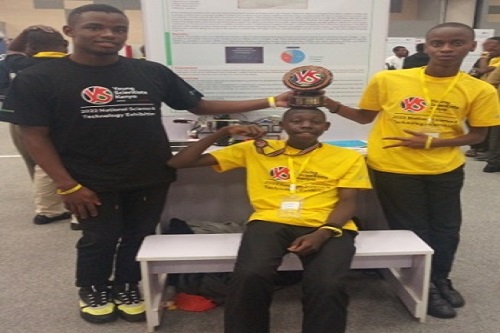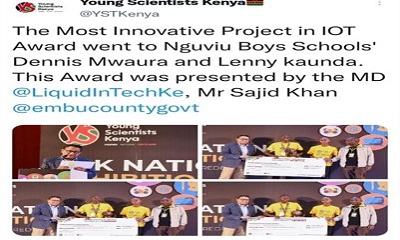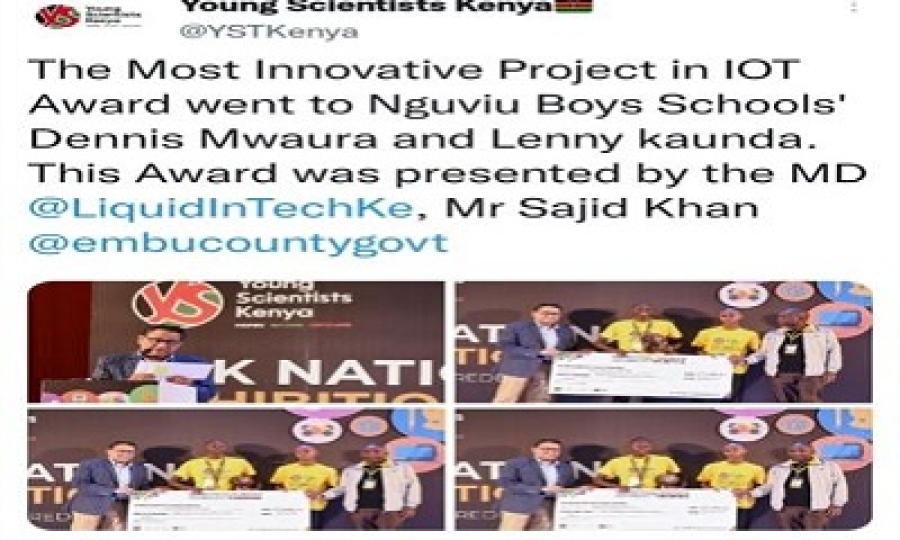STEM Model Schools Impact of Makerspace at Nguviu Boys High School
By Mr Francis Mugendi and Ms Sophy Njoki, Nguviu Boys High School
One emphasis and challenge by CEMASTEA on STEM model schools is supporting learners to engage in innovative activities in Marker Spaces that target solutions to societal problems. Nguviu Boy's School, one of the STEM Model Schools in Kenya, has embraced the MakerSpace Concept. As part of the team of teachers trained by CEMASTEA on STEM Education, we, Mr Francis Mugendi and Ms Sophy Njoki encourage and work with students in the Marker Space at the school. We challenge students to think of innovative ways to develop solutions to everyday problems. We posed the problem of quelea birds that threaten the enhancement of food security in the country. The quelea birds are a menace to farms where rice, millet, sorghum, wheat, sunflower and strawberries are.

Lenny Kaunda and Dennis Mwaura posing with the IOT award
Rice farmers in Mwea region have encountered huge losses severally following the destruction of thousands of acres of plantation by these birds. Farmers are forced to spend more time in the rice plantations chasing the birds away, which in most cases, outwit them due to their large numbers. The hide-and-seek game between farmers and the birds is not a productive venture, as it wastes time for farmers. When birds outwit farmers, it severely threatens food security and increases farmers' poverty index. Two of our students, Lenny Kaunda and Dennis Mwaura, took up the challenge. Working in the Makers Space, the two students developed an innovation, "Farm LEMWA Model 1", as an intervention to the menace of the quelea birds.

Presentation of award to Nguviu Boy's School. Proto-type of "Farm LEMWA Model 1"
The "Farm LEMWA Model 1" proto-type device designed and developed by the two students primarily uses robotic kits and laptops donated to Nguviu Boy's School by CEMASTEA as part of infrastructure support to STEM Model Schools. "Farm LEMWA Model 1" device consists of three major components; a central system, a radar sensor, and a power bank. Cognizant of the need to embrace green energy, the power bank has a provision to tap into solar energy. A backup battery to store the power generated during the day is part of the design to ensure the device is useful also at night. The excess stored energy can be used to do other functions like charging phones and torches and lighting up the farm to enhance security. Surveillance cameras linked with the owner are fitted to the device to ensure its safety. The ultrasonic sensors detect incoming birds from all directions. Once detected, a signal is sent to activate the high-pitched speaker, distracting the birds. Several sounds can be installed to outsmart the bird to avoid the monotony of sounds. Mr Mugendi, the lead mentor in the Maker Space, with the support of the school's Chief Principal and Patron of the Maker Space, Mr Paul Mwangele, guided the two students in enrolling the project in this year's 5th Young Scientist Kenya competitions. During the competition held at Sarit Centre Expo in Nairobi, Kenya, Farm LEMWA Model 1 emerged as the best in the Most Innovative Project in the Internet of Things (IoT) category. The Chief Principal thanked CEMASTEA for the continued support of STEM Model Schools.
Kindly give us your feedback using the link https://forms.gle/S2DPjwEBRNrdL4bt7
